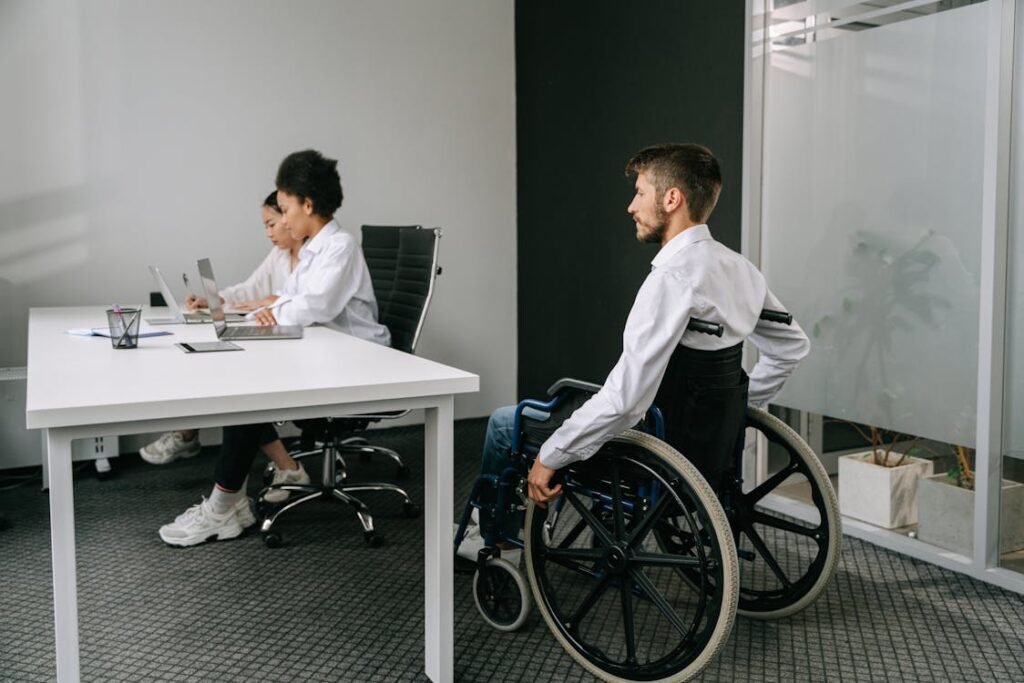An accessible office is more than just a legal requirement—it is a space where every employee, regardless of ability, feels comfortable, productive, and valued. In India, many office buildings and workplaces are still designed without accessibility in mind, making it difficult for employees with disabilities to navigate and perform their jobs effectively. However, businesses are beginning to realize that accessibility is not just about ramps and elevators; it is about creating an inclusive environment that empowers everyone.
Making an office space accessible does not require an expensive overhaul. Simple changes, thoughtful planning, and the use of technology can significantly improve the experience for employees with disabilities. Whether it is redesigning workstations, improving digital accessibility, or fostering an inclusive culture, businesses that prioritize accessibility gain more than just compliance—they create a workplace where all employees can contribute to their fullest potential.

Creating Physically Accessible Office Spaces
Rethinking Office Layouts for Mobility
A truly accessible office starts with a layout that allows employees with mobility impairments to move freely and comfortably.
Many traditional office spaces are cluttered with narrow hallways, tight seating arrangements, and desks placed too close together, making navigation difficult for wheelchair users or those with mobility aids.
Businesses can improve accessibility by ensuring that walkways are wide enough, common areas are spacious, and furniture placement allows easy movement.
Entrances and exits should also be designed with accessibility in mind. Automatic doors, ramps with proper inclines, and elevators with tactile buttons and voice guidance help employees with mobility challenges enter and exit the office safely.
Office doors should be wide enough to accommodate wheelchairs, and doorknobs should be replaced with lever handles, which are easier for individuals with limited hand mobility to operate.
Ensuring Accessible Restrooms and Common Areas
Restrooms are a crucial part of an accessible office, yet many workplaces in India still lack properly designed facilities for employees with disabilities.
Accessible restrooms should be spacious enough to accommodate a wheelchair and include grab bars for support. Sinks, soap dispensers, and hand dryers should be installed at a height that is easy to reach, and doors should have handles that require minimal effort to open.
Break rooms, cafeterias, and meeting areas should also be designed to accommodate employees with disabilities. Adjustable-height tables, accessible seating arrangements, and clear pathways ensure that everyone can comfortably use these spaces.
Businesses should also consider installing Braille labels and audio guidance systems in shared areas to assist employees with visual impairments.
Improving Workplace Signage and Navigation
Many offices rely on standard signage that may not be readable or understandable for employees with disabilities. Improving wayfinding systems with clear, high-contrast signage and Braille labels makes navigation easier for visually impaired employees.
Audio guidance systems and tactile floor paths can further enhance accessibility.
For employees with cognitive disabilities, simple and easy-to-read signage helps reduce confusion and improve independence in the workplace.
Instead of relying solely on written instructions, offices can use pictograms and universally recognized symbols to guide employees through the workspace.
Enhancing Desk and Workstation Accessibility
An inclusive office should provide workstations that meet the needs of employees with different abilities.
Adjustable-height desks allow wheelchair users to work comfortably, while ergonomic chairs with proper back support accommodate employees with physical conditions that affect their posture or mobility.
For employees with limited hand dexterity, keyboards with larger keys, speech-to-text software, and ergonomic mice can improve comfort and efficiency.
Offices should also provide sufficient lighting, glare-free screens, and adjustable monitors for employees with visual impairments, ensuring they can work without unnecessary strain.

Leveraging Technology to Improve Workplace Accessibility
Digital Accessibility for an Inclusive Office
As businesses increasingly rely on digital tools for communication, collaboration, and daily operations, ensuring that these platforms are accessible to all employees is essential.
Many individuals with disabilities face challenges when using office software, navigating company websites, or participating in virtual meetings due to inaccessible design. Businesses that prioritize digital accessibility enable their employees to work efficiently without barriers.
One of the simplest ways to improve digital accessibility is by ensuring that all company websites, portals, and internal software comply with global accessibility standards, such as the Web Content Accessibility Guidelines (WCAG).
This means incorporating features like screen reader compatibility, high-contrast text options, and alternative text for images.
Employees with visual impairments rely on screen readers to access digital content, so making sure that all company documents and platforms are compatible with assistive technology is critical.
Assistive Software and Tools for Employees
Technology can significantly enhance the experience of employees with disabilities in the workplace.
Many Indian startups and global tech companies have developed assistive tools that help individuals perform tasks more efficiently, ensuring they can work independently and productively.
Speech-to-text software is one such innovation that enables employees with hearing impairments or those who have difficulty typing to communicate effectively.
Tools like Google Live Transcribe or Otter.ai convert spoken words into text in real time, allowing employees to follow conversations during meetings or take notes without difficulty.
Similarly, text-to-speech software helps employees with visual impairments by reading digital text aloud, making emails, reports, and documents more accessible.
For employees with mobility impairments, voice-activated assistants like Siri, Google Assistant, and Alexa allow them to perform tasks without using a keyboard or mouse.
Gesture-based navigation and eye-tracking technology also enable individuals with limited hand movement to operate computers seamlessly. Businesses that invest in these tools create an inclusive digital workspace where all employees can contribute effectively.
Making Virtual Meetings More Accessible
With the rise of remote and hybrid work models, virtual meetings have become a standard part of office life. However, these meetings can be difficult for employees with disabilities if accessibility features are not in place.
Businesses can improve inclusivity by enabling live captions, ensuring that video conferencing platforms support sign language interpretation, and providing transcripts of meetings.
Platforms like Microsoft Teams, Zoom, and Google Meet offer built-in accessibility features such as automated captions, screen reader compatibility, and keyboard shortcuts.
Employers should encourage their teams to use these features and provide training on how to make virtual meetings more accessible.
Additionally, businesses should allow employees with disabilities to customize their meeting experience.
Providing options for different communication formats, such as chat-based discussions, audio-only participation, or pre-recorded video updates, ensures that employees with different needs can engage in a way that works best for them.
Training Employees on Accessibility Best Practices
Technology alone cannot create an inclusive workplace—it must be supported by awareness and education. Many accessibility challenges arise because employees and managers are unaware of the barriers their colleagues with disabilities face.
Providing training on digital accessibility best practices helps ensure that everyone in the workplace understands how to create and share content in an inclusive manner.
For example, employees should be encouraged to use clear, readable fonts in documents, provide alternative text for images, and format emails so that screen readers can interpret them correctly.
Simple practices like using descriptive subject lines, structuring documents with headings, and avoiding complex jargon make digital communication more inclusive.
By combining technology with awareness, businesses can create digital workplaces where employees with disabilities can perform at their best without unnecessary challenges.

Fostering an Inclusive Workplace Culture
Shifting from Awareness to Action
Creating an accessible office is not just about infrastructure and technology—it is about building a workplace culture that embraces inclusion at every level.
Many organizations implement accessibility changes but fail to foster an environment where employees with disabilities feel truly valued. Businesses must go beyond policies and physical changes to create a culture where inclusion is a shared responsibility among all employees.
An inclusive culture starts with leadership. When company leaders actively promote accessibility and set the expectation that inclusion is a priority, it creates a ripple effect throughout the organization.
Leaders should openly discuss the importance of workplace accessibility, share success stories of employees with disabilities, and integrate inclusivity into the company’s core values.
When employees see that accessibility is not just an HR initiative but a fundamental part of the company’s identity, they are more likely to engage with it meaningfully.
Encouraging Open Communication and Feedback
Many employees with disabilities hesitate to voice their concerns about workplace barriers due to fear of being seen as burdensome.
Employers must create a work environment where individuals feel comfortable discussing their needs without hesitation. Regular check-ins, employee surveys, and open discussions about accessibility challenges help organizations identify areas for improvement.
One way to encourage open communication is by appointing an accessibility officer or forming an internal accessibility committee.
These individuals can serve as advocates for employees with disabilities, ensuring that their concerns are addressed and that changes are implemented effectively.
Companies that actively seek feedback from employees with disabilities create an environment where inclusion is an ongoing conversation rather than a one-time project.
Inclusive Hiring and Career Growth Opportunities
Accessibility should extend beyond office spaces and digital tools—it should be embedded in hiring and career development practices. Many talented professionals with disabilities struggle to find opportunities due to unconscious biases in hiring processes.
Businesses must ensure that their recruitment strategies are inclusive and that interview processes accommodate different abilities.
Offering alternative application methods, providing interview accommodations, and using skill-based assessments instead of rigid, traditional interviews can help businesses attract a diverse pool of candidates.
Additionally, companies should actively partner with disability-focused job platforms and vocational training programs to reach skilled candidates who may otherwise be overlooked.
Beyond hiring, organizations must provide career growth opportunities for employees with disabilities.
Professional development programs, mentorship initiatives, and leadership training should be accessible to all employees, ensuring that individuals with disabilities have the same opportunities for advancement as their colleagues.
Recognizing and Celebrating Inclusion
A workplace that values accessibility should celebrate diversity and inclusion regularly.
Recognizing employees with disabilities for their contributions, organizing awareness events, and participating in global disability inclusion initiatives reinforce a company’s commitment to accessibility.
Events such as the International Day of Persons with Disabilities provide an opportunity for organizations to showcase their inclusion efforts, educate employees, and continue building a culture of accessibility.
When businesses create an inclusive environment that prioritizes accessibility at every level, they not only enhance the experiences of employees with disabilities but also foster a more innovative, collaborative, and engaged workforce.

Addressing Common Workplace Accessibility Challenges
Overcoming Physical Barriers in Office Spaces
Despite increasing awareness about accessibility, many office buildings in India still have physical barriers that make it difficult for employees with disabilities to navigate their work environment.
Some offices are located in older buildings with narrow doorways, steep staircases, or uneven flooring, which can pose serious challenges for individuals with mobility impairments.
Even in modern office spaces, poorly designed layouts, high desks, and inaccessible meeting rooms create unnecessary obstacles.
Businesses that rent or own office spaces in inaccessible buildings must work towards making gradual improvements.
If complete renovations are not immediately possible, small yet impactful changes—such as installing portable ramps, ensuring adequate space between desks, and providing height-adjustable workstations—can make a significant difference.
Employers can also collaborate with architects and accessibility consultants to plan long-term modifications that meet the needs of all employees.
Tackling Digital Exclusion in the Workplace
While many companies have adopted digital tools to improve efficiency, not all software platforms and communication systems are designed with accessibility in mind.
Employees with visual impairments often struggle to access work-related documents, as some file formats are not compatible with screen readers.
Similarly, individuals with hearing impairments may find it difficult to engage in virtual meetings if captions or sign language interpretation options are not available.
To address digital exclusion, companies must evaluate their existing software and make necessary upgrades.
Choosing applications with built-in accessibility features, such as voice recognition, real-time captions, and text-to-speech functionality, can enhance the digital work experience for employees with disabilities.
IT teams should also ensure that all internal websites, HR portals, and work collaboration tools adhere to accessibility guidelines, making them usable for all employees.
Changing Mindsets About Productivity and Disability
One of the biggest challenges employees with disabilities face is the assumption that they are less productive or require excessive accommodations.
This outdated mindset discourages inclusion and prevents businesses from tapping into a highly skilled workforce.
Employers must challenge these misconceptions by educating teams on the capabilities of employees with disabilities and the minimal adjustments required to support them.
Workplace accessibility should be seen as an enabler, not a burden. Employees with disabilities bring unique problem-solving skills, creativity, and resilience to the workplace.
Businesses that embrace accessibility as a strength rather than a challenge benefit from a more diverse, motivated, and engaged workforce.
Making Accessibility a Continuous Process
A common mistake businesses make is treating accessibility as a one-time initiative rather than an ongoing commitment. As technology evolves and new workplace trends emerge, accessibility requirements also change.
Organizations must continuously assess their workplace policies, infrastructure, and tools to ensure they remain inclusive.
Regular audits, employee feedback, and accessibility training sessions can help businesses stay ahead of potential barriers.
Partnering with accessibility experts, disability rights organizations, and startups specializing in workplace inclusion can also provide valuable insights into making long-term improvements.
By recognizing accessibility as an ongoing journey rather than a one-time fix, businesses can create office spaces that are truly inclusive, ensuring that all employees—regardless of ability—can work with dignity, independence, and confidence.

The Economic and Competitive Advantages of an Accessible Workplace
Gaining a Competitive Edge Through Inclusion
Businesses that prioritize accessibility are not only making ethical choices but also gaining a strong competitive advantage. An inclusive workplace attracts top talent, enhances employee satisfaction, and improves overall productivity.
Companies that embrace accessibility create environments where employees can work without barriers, leading to higher engagement and retention rates.
In India, where a significant portion of the population consists of individuals with disabilities, businesses that invest in accessibility tap into a largely underutilized talent pool.
Many skilled professionals remain unemployed due to inaccessible work environments, despite being fully capable of excelling in their roles.
By actively recruiting and retaining employees with disabilities, companies differentiate themselves from competitors and establish a reputation as progressive, forward-thinking employers.
Enhancing Brand Reputation and Customer Trust
Consumers today are more socially conscious and tend to support businesses that align with inclusive values. Companies that demonstrate a commitment to accessibility not only attract diverse talent but also build stronger relationships with customers and clients.
Many individuals with disabilities, as well as their families and allies, prefer to engage with businesses that promote inclusion and accessibility in their practices.
Accessibility also plays a crucial role in global business partnerships. Many multinational corporations require their vendors and business partners to adhere to strict diversity and inclusion policies.
Indian companies that proactively implement accessibility measures position themselves as preferred partners for global collaborations, increasing their business opportunities and market reach.
Boosting Employee Productivity and Workplace Efficiency
A well-designed accessible workplace benefits all employees, not just those with disabilities. Ergonomic furniture, clear signage, digital accessibility tools, and flexible work arrangements improve overall efficiency, reduce workplace stress, and enhance collaboration.
When employees work in an environment that is designed to accommodate diverse needs, they experience fewer challenges and can focus more on their tasks.
For example, voice recognition technology, which was originally developed to assist individuals with mobility impairments, is now widely used by employees to streamline their workflow.
Similarly, real-time captioning and accessible video conferencing tools improve communication for everyone, not just for employees with hearing impairments. These innovations make work processes smoother and more inclusive for all team members.
Reducing Legal Risks and Compliance Costs
With India strengthening its legal framework for workplace accessibility, companies that fail to comply with accessibility laws risk financial penalties and reputational damage.
The Rights of Persons with Disabilities Act, 2016, mandates that businesses provide reasonable accommodations and ensure equal opportunities for individuals with disabilities.
Proactively implementing accessibility measures helps businesses avoid costly legal disputes and maintain compliance with national and international regulations.
Additionally, many government initiatives offer financial incentives, tax benefits, and funding opportunities for businesses that invest in accessibility.
Companies that take advantage of these programs can offset the costs of infrastructure modifications and assistive technology, making inclusion an economically viable strategy.
The Future of Workplace Accessibility in India
As more Indian startups, corporations, and government bodies push for inclusive workplaces, accessibility will become a defining factor in business success.
Forward-thinking companies that integrate accessibility into their core strategies will not only meet legal requirements but also drive innovation, improve employee satisfaction, and attract a wider customer base.
Businesses that invest in accessibility today will be at the forefront of India’s evolving corporate landscape. By making workplaces more inclusive, companies set themselves up for long-term success while contributing to a more equitable and diverse workforce.

The Role of Startups and Emerging Technologies in Workplace Accessibility
How Indian Startups Are Transforming Accessibility
Indian startups are playing a crucial role in redefining workplace accessibility by developing innovative solutions tailored to the needs of employees with disabilities.
Unlike traditional businesses that often see accessibility as an afterthought, startups are building accessibility into their core products and services.
From AI-powered recruitment tools to smart office navigation systems, these emerging companies are bridging gaps that have long made workplaces difficult for employees with disabilities.
One of the key contributions of startups is in the development of assistive technologies. Companies specializing in prosthetics, speech recognition, and AI-driven accessibility tools are making it easier for employees with disabilities to work independently.
For example, startups like Robobionics are providing advanced bionic prosthetic solutions that help individuals with upper-limb differences perform tasks that would otherwise be challenging in conventional office settings.
AI and Automation: Making Workspaces More Inclusive
Artificial intelligence is at the forefront of accessibility innovation. AI-powered voice assistants, automated captioning, and text-to-speech applications are removing communication barriers in the workplace.
Employees with visual impairments can use AI-driven screen readers to access documents and emails, while those with hearing impairments can rely on real-time transcription services to follow meetings and discussions.
Automation is also enhancing accessibility in physical office spaces.
Smart office solutions such as voice-activated elevators, automated doors, and IoT-enabled workplace navigation systems are helping employees with mobility impairments move around offices with greater ease.
Some startups are even developing robotic assistants that assist employees with tasks like retrieving office supplies or setting up workstations according to their specific needs.
Virtual and Augmented Reality for Training and Work Adaptation
Virtual reality (VR) and augmented reality (AR) technologies are emerging as powerful tools for workplace inclusion.
Many startups are using these technologies to develop immersive training programs for employees with disabilities, allowing them to practice real-world job scenarios in a controlled and adaptable environment.
For example, VR can help employees with cognitive disabilities or anxiety-related conditions get accustomed to office settings before they physically enter them.
Companies are also using AR-based assistive devices that provide real-time guidance to employees with visual impairments, enabling them to navigate workplaces and interact with their environment more efficiently.
Personalized Accessibility Solutions for Employees
Every employee with a disability has unique needs, and startups are responding by developing personalized accessibility solutions.
AI-driven workplace assistants can now learn individual preferences and automatically adjust office settings, such as lighting, workstation height, and screen contrast, to meet the needs of specific employees.
Wearable technology is another area where startups are making a difference. Smart wearables, such as vibration-based notification devices for employees with hearing impairments or gesture-controlled prosthetics, are allowing individuals to work more comfortably and effectively.
By incorporating these solutions, businesses can offer a tailored experience that enhances employee autonomy and productivity.
The Future of Accessibility-Driven Innovation
With increased investment in accessibility-focused startups and growing awareness among businesses, the future of workplace accessibility in India looks promising.
Startups are not only developing solutions for large corporations but also creating scalable, affordable technologies that small and medium-sized businesses can implement.
As workplace accessibility becomes a priority, the collaboration between startups, established companies, and government initiatives will accelerate innovation.
Businesses that adopt these emerging technologies early will be better positioned to create inclusive workplaces that attract diverse talent and drive long-term success.
Conclusion
Creating accessible office spaces is not just about meeting legal requirements—it is about building workplaces where every employee can contribute and thrive. Businesses that prioritize accessibility benefit from a more engaged workforce, improved productivity, and a stronger reputation in the marketplace.
Indian startups are playing a critical role in driving this transformation, offering innovative solutions that make physical offices, digital workspaces, and hiring processes more inclusive. With the help of AI, automation, and assistive technologies, accessibility is becoming more practical and cost-effective for businesses of all sizes.
The shift toward workplace accessibility is not just a trend—it is the future of work. Companies that embrace inclusive practices today will gain a competitive advantage, attract top talent, and contribute to a more diverse and dynamic workforce. By continuously improving infrastructure, leveraging technology, and fostering a culture of inclusion, businesses can create environments where employees with disabilities are empowered to succeed.
The journey toward full workplace accessibility requires effort, but the rewards—both social and economic—are undeniable. The time to act is now, and companies that lead in accessibility will shape the future of India’s corporate landscape.



